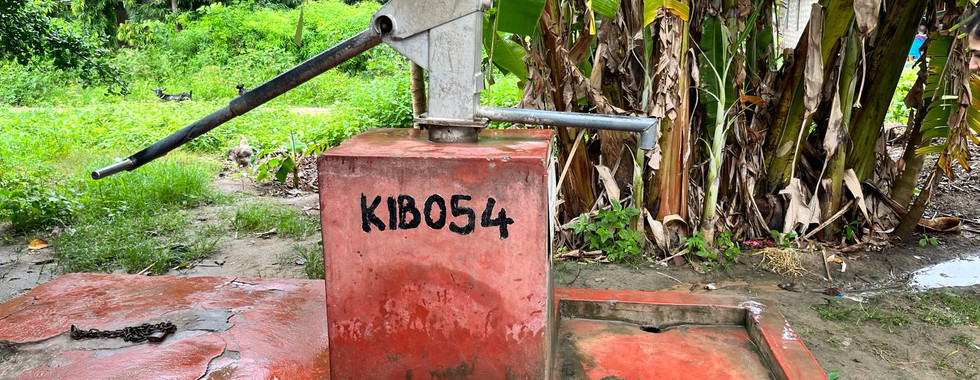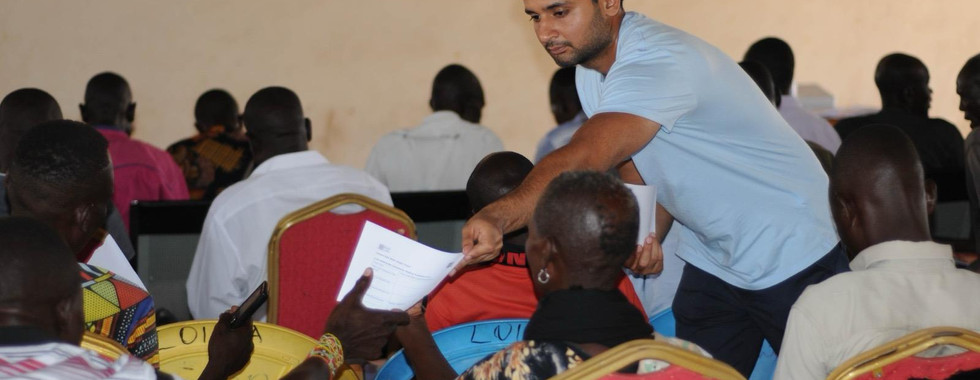First Climate and Griot Consulting partner on Long-term “Safe Water” Project
- FC-Newsteam

- 5. Juni 2024
- 5 Min. Lesezeit
Aktualisiert: 20. Sept. 2024
First Climate and Griot Consulting collaborate to scale up Maji Bora Borehole Project in East Africa
Carbon project developers team up to refurbish and install over six hundred freshwater pumps across two water-stressed counties in Kenya. The partnership is expected to reduce local carbon emissions regionally by lowering domestic dependency on water boiling and traveling great distances to access potable water. This small-scale, multi-county PoA project has the potential to improve the daily lives of one million people.

Water arrives in Turkana, Kenya. Photo credit: ©Griot Ltd.
The central aim of the Maji Bora Project is to address water scarcity in Kenya, Burundi, and Tanzania. The project will restore pre-existing, non-functioning boreholes and construct modern sustainable units, featuring hand and solar water pumping mechanisms. Just as the name Maji Bora – Kiswahili for “excellent water” indicates –the primary goal is to ensure access to safe water for local children, families, and farmers in the while simultaneously mitigating greenhouse gas emissions in the region through the avoidance of burning biomass to sanitize water.
The Griot team saw firsthand how previously installed boreholes which provided access to families and farms in the area had damaged pumps, needed major repair, or were completely inoperable. In most cases, there was no one on site with the necessary skills to fix them. Then Griot stepped in and created a project to alleviate some of the water strain in East Africa. This project has a design with unique and forward-thinking elements, which are the ongoing technical assistance and maintenance plans meant to guarantee its long-term goals and success.
Expert advice
As a consulting partner for the project developer Griot, First Climate is primarily responsible for the carbon management and documentation plans as well as the related registration and sale of project-generated carbon credits, which are expected to be issued in 2025. The initial contract between Griot and First Climate has been confirmed for the initial crediting period, which lasts five years. “When Griot approached us to advise on the project design, we at First Climate shared our long-standing expert advice regarding safe water and community projects, and longevity plans. Soon we began exploring the feasibility of including solarization of the water pumps. We are excited about the impact this sustainable project will have on the region and keen to support Griot in scaling up this and similar activities,” commented Yves Keller, Head of Article 6 and Community-based projects at First Climate. Once the project design has been validated, First Climate will serve as the exclusive marketer of upcoming carbon credits, which are expected to be validated by and issued on the Gold Standard registry.
Necessary water intervention
The countries covered by this project, Kenya, Burundi, and Tanzania, are among the African countries with the highest increase in charcoal and wood fuel demand, and according to the United Nations, these rates are expected to increase through 2040. Griot Consulting has identified Kenya, and specifically the counties of Turkana and Kilifi as the pilot locations for the Program of Activities, or PoA. Having a PoA status means that there are numerous micro-projects dispersed throughout the target area, which collectively amount to the full scope of the project and its related emission reductions capacity. Common in the project areas are high concentrations of households which rely on three-stone fires and inefficient cookstoves to boil contaminated water, which is primarily done through the burning of non-renewable fuel sources. The presence of functional boreholes is expected to decrease deforestation rates regionally.
Water insecurity in these areas of East Africa is undeniably high; for example, in Tanzania about 28% of the population lacks access to clean water. Nearly every day, most households in the entire PoA area send out family members, usually women and girls, to travel long distances to collect water – which usually comes from an unsafe natural source. It typically means that women and girls are required to travel distances of several kilometers or more to fetch and deliver water often in unsealed jerry cans. The means of travel and distances alone results in further polluting the collected water.
Photo credit for photos 1 through 4: ©Griot Ltd.
Griot has an expansive network of field agents in place who make sure that the project activity does not end once a new borehole is drilled and brought on-line. The project has a provision for regular maintenance plans as well as technical assistance to local staff to keep boreholes functioning. They are trained to inspect the pumps and make repairs when needed, and conduct quarterly site visits that include monitoring, inspections, and documenting impacts. The project developer manages the daily operations and makes sure that the project boreholes are functioning and well maintained. More specifically, each borehole has a designated field agent, many of whom are women, who is responsible for its documentation regarding usage, specifications, operational functioning, and maintenance of the borehole itself on a regular basis.
Pumping climate action
Hywel George, Global Operations Director of Griot Consulting, explains why having First Climate on board is key to the project’s success: “We understand our mission is part of a huge undertaking in East Africa. It’s wonderful to have in First Climate one of the most experienced and successful carbon consultancies on board with us. We rely on their expert advice and understanding of how to navigate the voluntary carbon market.”
Already, First Climate’s involvement has resulted in a successful preliminary listing on the Gold Standard registry and has confirmed a project auditor, who will accompany the project as its application moves through the validations process. The validation process is expected to be completed by the end of Q3 2024. The Maji Bora partnership is slated to continue and develop throughout the contractual three crediting periods on the Voluntary Carbon Market (VCM). Initially, the partners have agreed to the two pilot PoAs around the maintenance and construction of boreholes, however they are exploring other projects related to carbon removal projects.
What is the "safe water" project technology?
For millions of people in the world, access to clean drinking water is not a given. Instead, they depend on unsafe water sources and must purify their water through boiling, usually over open fires fueled by wood or charcoal. Not only is this inefficient, it also leads to avoidable carbon emissions. Technologies such as boreholes can reduce reliance on boiled water, helping to reduce emissions. Similar projects involve the construction or restoration of wells, which save fuel costs and avoid carbon emissions.
About First Climate
First Climate is a leading global provider of carbon management and renewable energy solutions for corporate and public clients. The company develops and finances verified carbon offset projects around the world. By supporting these projects, companies can reduce their own emissions with an equally beneficial impact on the climate and promote sustainable development in local project regions. With access to a broad network of global partners and expertise in providing renewable energy on demand, First Climate also offers companies customized options for reducing their energy-related carbon footprint. www.firstclimate.com
About Maji Bora
Griot Consulting was built on a commitment to strive towards the eradication of poverty and suffering world-wide.
The foundational project in Kenya was to provide opportunities for girls choosing education rather than genital mutilation (FGM) and child marriage. Then the company spotted a finance model for international development that moved away from the traditional donor-led model favoured by charities and NGOs. And so Griot began working on projects that created benefits in communities in need, while providing international markets with tradable carbon credits. This method creates a transactional relationship between beneficiaries and investors - a model far removed from what has been the norm for many years. https://griot.co.ke/















